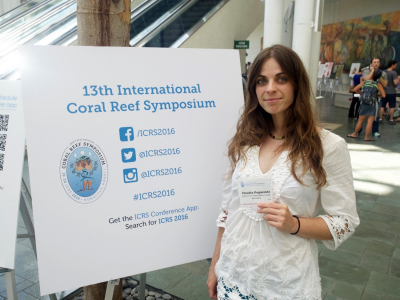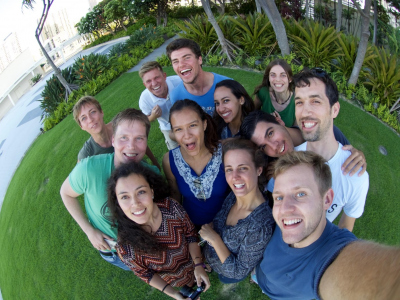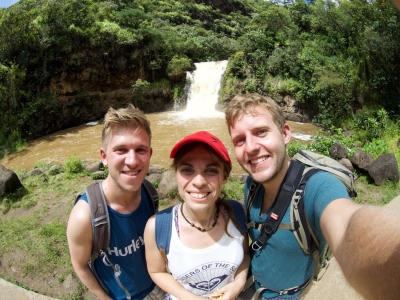Die Inhalte dieser Seite sind leider nicht auf Deutsch verfügbar.
Seitenpfad:
- Graduate School GLOMAR
- PhD student reports
- Conference Reports
- Conference Reports 2016
- Claudia Pogoreutz
Claudia Pogoreutz
Report of GLOMAR PhD student Claudia Pogoreutz about her participation in the 13th International Coral Reef Symposium (ICRS) in Honolulu, Hawaii, USA from 19 - 24 June 2016
The International Coral Reef Symposium (ICRS), hosted every four years by the International Society for Reef Studies (ISRS), is the largest gathering of coral reef scientists worldwide. The 13th meeting was held at the Hawai’i Convention Center in Honolulu, and attracted more than 2500 participants from around the globe, making it the largest ICRS ever. Themed “Bridging Science to Policy”, a special focus of this gathering was to develop partnerships between the scientific community and political leaders, and to apply the best possible science to develop a framework for the quantitative assessment of the effectiveness of coral reef protection and recovery. In a total of 94 sessions, more than 1500 talks and 700 posters were presented, covering topics ranging from reef conservation and resilience over physiology and symbiosis research to molecular applications in micro- and cell biology. Coincidentally, the 13th ICRS was overshadowed by the currently ongoing Third Global Bleaching Event, a prolonged period of elevated surface water temperatures causing mass coral bleaching around the globe which started in mid-2014 and is predicted to last until the end of 2016 or even well into 2017. In this context, global environmental change, particularly climate change, presented an overarching theme connecting various sessions that might not be too closely related at first glance, but all of which have the ultimate goal to sustain coral reefs in the future.
Despite being a rather large event, a lot of time was allocated to networking opportunities. Starting with a relaxed icebreaker event on the 19 June, even the participants that had literally just arrived after a long and exhausting flight (including myself) were able to quickly get into the conference spirit by catching up with peers in a laid-back atmosphere. Among all the familiar and new faces, I was particularly excited about meeting up with the host work group of my previous research stays, the Coral Reef Genomics Lab of the King Abdullah University of Science and Technology (KAUST), and past members of the Marine Ecology (University of Bremen) and Coral Reef Ecology Groups (Leibniz Center for Tropical Marine Ecology – ZMT). Apart from this event, there were numerous other opportunities for exchange, discussion, and networking scheduled. For instance, on each night of the conference, strongly frequented poster sessions were held over nibbles. In addition, on each conference day, student attendants were encouraged to sign up for joining one of several small lunch groups with volunteering ‘seasoned scientists’ and experts in their fields. This mentoring program was intended to facilitate the exchange between experienced reef researchers and students at different stages of their career, and was very well attended.
On 20 June, I presented results from my PhD project in a talk entitled “Responses of the Coral Holobiont to Labile Dissolved Organic Carbon Shed Light on the Role of Dinitrogen Fixation in Bleaching” in Session 11: “Animal-Algal Symbioses: Molecular, Physiological, and Genetic Interactions, Processes and Adaptations”. This exciting session was among the largest, lasting for two and a half days, and covering a series of talks highly interesting for me due to the relevance for my own research on coral holobiont stress physiology. In addition, I enjoyed a range of presentations particularly in the parallel sessions 9: “Biogeochemistry of Coral Reef Systems”, which were dominated by exciting recent work on microbial nitrogen fixation in coral holobionts, and 12: “The Reef Microbiome and Reef Microbial Interactions and Changes”.
Overall, the 13th ICRS was a great and stimulating opportunity to present results from my exciting PhD project. I deeply enjoyed the fruitful exchange with my peers. Specifically, I received a lot of valuable feedback about my results from other scientists in the field as well as from collaborators, which will help in the preparation and revision of my current manuscripts. Finally, my attendance at this gathering allowed the discussion of future collaborations and research stays. In a nutshell, visiting this important meeting in the final months of my PhD term constituted a highly important opportunity for me as a not quite fully fledged early stage scientist, and a great chance for networking. In this context, I would like to gratefully acknowledge funding by GLOMAR – Bremen International Graduate School for Marine Sciences, as well as the ZMT. A big Thank you for making this trip possible! Mahalo!
Despite being a rather large event, a lot of time was allocated to networking opportunities. Starting with a relaxed icebreaker event on the 19 June, even the participants that had literally just arrived after a long and exhausting flight (including myself) were able to quickly get into the conference spirit by catching up with peers in a laid-back atmosphere. Among all the familiar and new faces, I was particularly excited about meeting up with the host work group of my previous research stays, the Coral Reef Genomics Lab of the King Abdullah University of Science and Technology (KAUST), and past members of the Marine Ecology (University of Bremen) and Coral Reef Ecology Groups (Leibniz Center for Tropical Marine Ecology – ZMT). Apart from this event, there were numerous other opportunities for exchange, discussion, and networking scheduled. For instance, on each night of the conference, strongly frequented poster sessions were held over nibbles. In addition, on each conference day, student attendants were encouraged to sign up for joining one of several small lunch groups with volunteering ‘seasoned scientists’ and experts in their fields. This mentoring program was intended to facilitate the exchange between experienced reef researchers and students at different stages of their career, and was very well attended.
On 20 June, I presented results from my PhD project in a talk entitled “Responses of the Coral Holobiont to Labile Dissolved Organic Carbon Shed Light on the Role of Dinitrogen Fixation in Bleaching” in Session 11: “Animal-Algal Symbioses: Molecular, Physiological, and Genetic Interactions, Processes and Adaptations”. This exciting session was among the largest, lasting for two and a half days, and covering a series of talks highly interesting for me due to the relevance for my own research on coral holobiont stress physiology. In addition, I enjoyed a range of presentations particularly in the parallel sessions 9: “Biogeochemistry of Coral Reef Systems”, which were dominated by exciting recent work on microbial nitrogen fixation in coral holobionts, and 12: “The Reef Microbiome and Reef Microbial Interactions and Changes”.
Overall, the 13th ICRS was a great and stimulating opportunity to present results from my exciting PhD project. I deeply enjoyed the fruitful exchange with my peers. Specifically, I received a lot of valuable feedback about my results from other scientists in the field as well as from collaborators, which will help in the preparation and revision of my current manuscripts. Finally, my attendance at this gathering allowed the discussion of future collaborations and research stays. In a nutshell, visiting this important meeting in the final months of my PhD term constituted a highly important opportunity for me as a not quite fully fledged early stage scientist, and a great chance for networking. In this context, I would like to gratefully acknowledge funding by GLOMAR – Bremen International Graduate School for Marine Sciences, as well as the ZMT. A big Thank you for making this trip possible! Mahalo!





